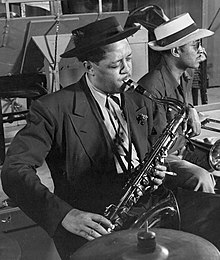Lester Young
| Lester Young | |
|---|---|

Lester Young in 1944, wearing pork pie hat
|
|
| Background information | |
| Birth name | Lester Willis Young |
| Also known as | "Pres" or "Prez" |
| Born |
August 27, 1909 Woodville, Mississippi, U.S. |
| Origin | Kansas City, Missouri, U.S. |
| Died | March 15, 1959 (aged 49) New York City, New York, U.S. |
| Genres | Jazz |
| Occupation(s) | Musician |
| Instruments | Tenor saxophone, clarinet |
| Years active | 1933–1959 |
| Labels | Verve, Commodore, Savoy, OJC |
Lester Willis Young (August 27, 1909 – March 15, 1959), nicknamed "Pres" or "Prez", was an American jazz tenor saxophonist and occasional clarinetist.
Coming to prominence while a member of Count Basie's orchestra, Young was one of the most influential players on his instrument. In contrast to many of his hard-driving peers, Young played with a relaxed, cool tone and used sophisticated harmonies, using "a free-floating style, wheeling and diving like a gull, banking with low, funky riffs that pleased dancers and listeners alike".
Known for his hip, introverted style, he invented or popularized much of the hipster jargon which came to be associated with the music.
Lester Young was born in Woodville, Mississippi, and grew up in a musical family. His father, Willis Handy Young, was a respected teacher, his brother Lee Young was a drummer, and several other relatives performed music professionally. His family moved to New Orleans, Louisiana, when Lester was an infant and later to Minneapolis, Minnesota. Although at a very young age Young did not initially know his father, he learned that his father was a musician. Later Willis taught his son to play the trumpet, violin, and drums in addition to the saxophone.
Lester Young played in his family's band, known as the Young Family Band, in both the vaudeville and carnival circuits. He left the family band in 1927 at the age of 18 because he refused to tour in the Southern United States, where Jim Crow laws were in effect and racial segregation was required in public facilities.
In 1933 Young settled in Kansas City, where after playing briefly in several bands, he rose to prominence with Count Basie. His playing in the Basie band was characterized by a relaxed style which contrasted sharply with the more forceful approach of Coleman Hawkins, the dominant tenor sax player of the day.
...
Wikipedia
